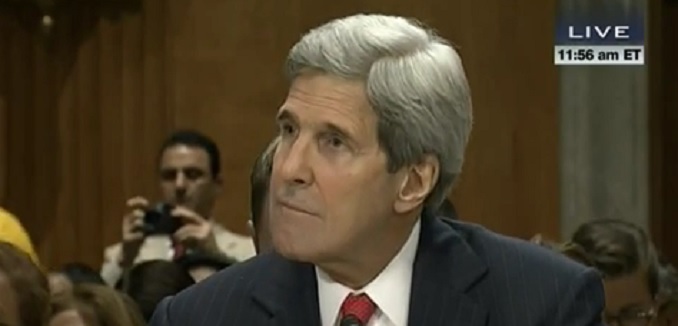The State Department went on offense late Tuesday to correct what spokeswoman Jen Psaki underlined was wrongheaded media coverage of Congressional testimony given earlier in the day by Secretary of State John Kerry, in which statements by Kerry were widely described as having blamed Israel for the breakdown in peace talks between Jerusalem and the Palestinians.
On MEP: @JohnKerry was again crystal clear today that both sides have taken unhelpful steps and at no point has he engaged in a blame game.
— Jen Psaki (@statedeptspox) April 8, 2014
On MEP cont..He even singled out by name Prime Minister Netanyahu for having made courageous decisions throughout process.
— Jen Psaki (@statedeptspox) April 8, 2014
A formal statement provided to reporters by the State Department repeated those tweets almost verbatim.
Initial media coverage had largely echoed the descriptions provided by a quickly published article in Israel’s left-leaning Haaretz, which stated that Kerry had placed the blame for failed peace talks on Israel (Haaretz subsequently changed the subhead of that article to gesture toward criticism of its coverage, shifting from “Secretary of state says Israel did not release prisoners on time, approved construction in Jerusalem and ‘poof’ we found ourselves where we are” to “U.S. officials later try to play down Kerry’s comments, saying he did not engage in a blame game and that both sides took ‘unhelpful steps'”).
Any timeline that holds Israel responsible for the breakdown in talks would be taken in many quarters as strained. Conveying Kerry’s Congressional statements, for instance, the Los Angeles Times tersely noted that “the announcement on the housing units came as the Palestinians were refusing to agree to continue the peace talks.”
The permits themselves were not new tenders, but were part of a reissued call for the construction of homes in the Jerusalem neighborhood of Gilo. Construction in that part of Jerusalem has often vexed analysts, journalists, and diplomats trying to grasp the dynamics of the peace process. Columnist Jeffrey Goldberg, who at the time was advocating that the Obama administration “talk to Israel” about settlements in the West Bank, attempted to shed light on the issue back in 2009:
The building of apartments in Gilo is irrelevant to eventual disposition of Jerusalem because everyone — the Americans, the Palestinians and the Israelis — knows that Gilo, the suburb that is the latest source of tension between Washington and Jerusalem, will undoubtedly end up in Israel as part of a negotiated solution (not that that’s ever happening, by the way). It doesn’t matter, then, if the Israelis build 900 housing units in Gilo or 900 skyscrapers: Gilo will be kept by Israel in exchange for a one-to-one land swap with Palestine.
[Photo: Washington Free Beacon / YouTube]




